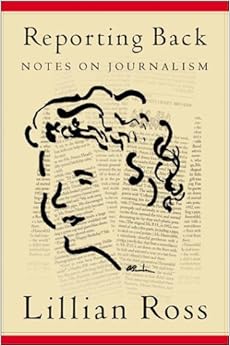Sunday, February 15, 2015
A Skeptical Look at Lillian Ross’s Rules of Reporting
By Jenna Hutchins
Lillian Ross is more than qualified to write on what she believes to be the proper way of reporting. Her personal guidelines are definitely insightfulㄧbeing compiled and decided after years of professional writing for The New Yorker magazine. Although she has many words of wisdom, I disagree with Ross on a few of her “principles.”
I would describe Ross’s list of rules to be overly ethical and slightly idealistic. Two points she makes is that she does not want to write about anyone who would not want her to and anyone whom she does not like. Perhaps our styles differ, but I believe that to get the truth and bring information to the public that it would not have otherwise been known requires digging and hard-hitting reporting on those who may not appreciate the investigation. This may stem from my fascination with muckrakers who expose wrongdoing, and in this instance, it is necessary to go after those you may not like, as long as you report the story objectively.
It is idealistic to say, too, that every individual you write about should be considered a friend, and remain that way long after publication. This may happen in some cases, and I generally believe it would be beneficial to a reporter to establish some type of rapport with the individual supplying him or her with the story. However, I do not believe it is necessary, or even feasible, to have a relationship with every headline that walks in. I understand being kind to sources, during and after writing, but I do not agree with the way that Ross idealizes her reporting.
I could not disagree more with Ross’s statement that she chooses “to write only about people, situations, and events that appeal to [her].” As with any job, sometimes you are going to have to do things you don’t want to do. If you are working your way up the ranks of your job, you do any assignment your boss asks you to do. Not only this, but there may be a story that you dislike, but the public deserves to know it. You may not want to write about it, but it is your duty as a journalist to inform the public on the important issues.
I may be too harsh with my criticisms of Lillian Ross’s rules for reporting. Although I disagree on quite a few of her guidelines, they are, in fact, just guidelines. I’m sure she herself has broken these rules from time to time. If not, I’m sure the discrepancy is due to just very different styles of reporting and types of articles being written. All in all, Lillian Ross is still a professional reporter that I can learn much from.
Subscribe to:
Post Comments (Atom)

No comments:
Post a Comment